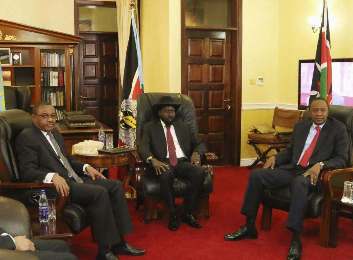Juba accuses ex-VP Machar of rejecting ceclared ceasefire
December 28, 2013 (JUBA) – South Sudan’s vice-president, James Wani Igga, has accused his predecessor, Riek Machar, of rejecting opportunities to end hostilities and putting obstacles in the way of peaceful dialogue to resolve the ongoing conflict, which has lasted almost two weeks.

NO TO POWER-SHARING
The spokesperson of South Sudan’s president Salva Kiir Mayardit said on Saturday that the government will not accept any proposal seeking its commitment to enter into negotiations aimed at reaching a power-sharing agreement with Machar.
“It will not make sense that the same person who was dismissed as part of the general change which western governments have all these times been advising, because of corruption, return to the same government in which he was dismissed after killing innocent people. This is unacceptable and it will never happen”, presidential spokesperson, Ateny Wek Ateny, said.
Reports from the talks, which are being mediated by regional leaders, have indicated a strong desire among East African countries to end the violence by bringing all the aggrieved parties on board.
“There is no meeting the president has ever held with foreign dignitaries, representatives and envoys without my presence. In these meetings and interactions, I have never heard anybody who has met the president talk about [a] power-sharing proposal”, Ateny said.
“What had always been discussed is the need to cease hostilities and to accept dialogue, which the president had already accepted without conditions”, the spokesperson told Sudan Tribune.
PUSH FOR DIALOGUE
The official said the main objective of the dialogue is to contain the conflict from escalating into major unrest and to prepare a conducive political ground for the 2015 general elections.
The talks are being chaired by the Inter-Governmental Authority on Development (IGAD), whose member countries currently include Djibouti, Ethiopia, Somalia, Sudan, Kenya and Uganda. South Sudan became a member in 2011 after it seceded from Sudan as part of a 2005 peace deal that was also mediated by IGAD.
“Actually this initiative came from IGAD member countries and the western envoys. The objective was to focus on how to handle political differences from shifting to tribal conflict”, Ateny said.
Since the fighting began in Juba on 15 December, the United Nations says that over 1,000 people are believed to have been killed. President Kiir’s government has accused Machar and his supporters of attempting to stage a coup. This has been strongly denied, with other accounts suggesting that fighting within the presidential guard broke out due to a dispute between soldiers from the Dinka and Nuer tribes.
Violence has since spread to other parts of South Sudan, displacing thousands of civilians. While the army has retaken Jonglei state capital Bor from mutineers, Unity state and much of Upper Nile remain in control of forces loyal to officers who switched allegiance.
Upper Nile and Unity are home to the country’s key oil fields, raising concerns that the unrest could cut off the economic lifeblood of the young nation, which derives nearly its entire government budget from oil revenues.
Ateny said that South Sudan’s “government agreed to the dialogue so that conducive ground is created for Riek Machar and his group to come back as normal citizens so that they can participate in the next elections. If they win elections, they will certainly take the office through [a] peaceful transfer of power”, he said.
During talks in Juba on Thursday and on Friday in Kenyan capital Nairobi, African leaders attempted to advance peace talks between president Kiir his political rivals.
Kenyan president Uhuru Kenyatta and Ethiopian prime minister Hailemariam Desalegn had “a constructive dialogue” with Kiir while they were in Juba, according to Ateny.
The president had agreed “in principle” to cease hostilities and enter negotiations with Machar, his spokesman said, without offering further details on the talks.
Ateny did not say whether the president would meet his former deputy face-to-face to peacefully discuss details of the dialogue.
The whereabouts of Machar remain unclear, although most African leaders with interest in resolving the conflict said IGAD would formally invite him to attend upcoming peace talks.
Late on Saturday, the government said that it would release all but three of the remaining senior officials that were arrested in connection with the alleged coup attempt that triggered the current crisis.
(ST)
Read all Sudan Tribune‘s coverage of the crisis in South Sudan here:
The latest tweets on the crisis in South Sudan:
